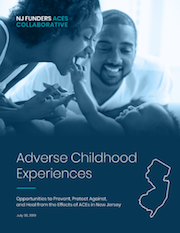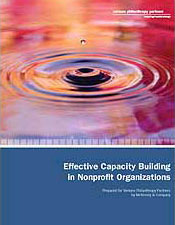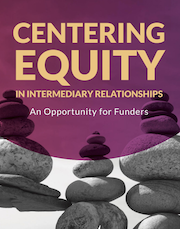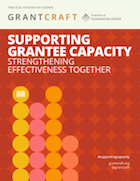Site Search
- resource provided by the Forum Network Knowledgebase.
Search Tip: Search with " " to find exact matches.

Alexis Bivens, Vice President of Strategic Initiatives and Managing Director of the Supporting Organizing Work Funders Collaborative, Connecticut Council on Philanthropy, presents the process and progress of how an affinity group transformed into a funders collaborative, how it was resourced, and challenges along the way.
The National Center for Family Philanthropy and Youth Philanthropy Connect, a program of the Frieda C. Fox Foundation, have joined together to bring new resources to the field of philanthropy focused on engaging the next generation of donors and family members. Igniting the Spark: Creating Effective Next Gen Boards is the first publication of its kind, offering a comprehensive overview of the growing practice among family foundations and donor advised fund holders of using next generation boards.
The issue brief outlines creative options for involving children as young as 8 in family philanthropy. It is supplemented by case studies of seven foundations using next gen boards and other approaches for engaging youth in philanthropy. Throughout both resources, the voices of next gen donors describe what works — and what doesn’t — providing family members and staff with guidance and insights new to the field.
What does effectiveness mean to foundations? Explore definitions, challenges, and tips for evaluating foundation effectiveness.
This guide from Rockefeller Philanthropy Advisors suggests that funders can make their grantmaking more responsive and efficient by combining the concepts of diversity and inclusion with basic due diligence.
The administration’s current attempt to exclude and expel people through sweeping executive overreach in defiance of the rule of law is separating families and striking fear in communities, and is part of a broader attempt to criminalize and invisibilize historically marginalized populations, starting with noncitizens.
Join Grantmakers Concerned with Immigrant And Refugees to learn how advocates are addressing the closure of the border and the resulting denial of access to safety while others are defending people who have made the United States their home.
SPEAKERS
Lillian Aponte, Executive Director, Florence Immigrant and Refugee Rights Project
Erika Pinheiro, Executive Director, Al Otro Lado
Fatima Saidi, Director, We Are All America
MODERATORS
Basma Alawee, Deputy Executive Director, Community Sponsorship Hub
Zenobia Lai, Executive Director, Houston Immigration Legal Services Collaborative
REGISTRATION
There is no cost for this webinar.
You will need to log in or create an account on GCIR's website to register for this program.
Please register for this program by 5pm PT on Friday, April 25th.

This report clarifies and broadens the definition of capacity building. The findings of this report represent a collective body of information that will be useful to the social, public, and private sectors.

Times of mass mobilization like the uprisings for Black lives and global crises like the COVID pandemic broaden awareness of the work of organizations, collectives, and other groups of people working to transform harmful systems. Some of these groups turn to intermediaries—fiscal sponsors and donor intermediaries—to provide back-office support, grant funding, and other services to support their ongoing work and evolution.
This report explores the ways in which the ecosystem of funders and intermediaries can better support these groups—which we’re calling “constituent-led groups”—who do their work without formal 501c3 status and are often led by and supporting historically oppressed communities.
Today, many constituent-led groups, particularly those that are smaller and geographically isolated, struggle to find fiscal sponsors and other intermediaries that share their values and can provide services that are deeply rooted in racial equity. For a number of reasons, funders—who can’t otherwise support constituent-led groups—often prioritize partnering with intermediaries with a high capacity for scaling services and distributing resources and funds. Though equity values are important to funders in selecting intermediaries to partner with, many funders don’t know what equity-centered services look like or how to support intermediaries in deepening this work.
In this report, we share different ways fiscal sponsors and donor intermediaries have approached deepening equity in their work while meeting the volume of demand from constituent-led groups and funders. We also offer some pathways forward for funders seeking to strategically invest in intermediaries to strengthen their capacity in these areas so they might better serve constituent-led groups.
The William and Flora Hewlett Foundation has had a long-standing commitment to increasing the effectiveness of grantmaking organizations, a commitment reflected in its Philanthropy Grantmaking Program. In 2015, the Foundation commissioned Harder+Company Community Research, in partnership with Edge Research, to conduct a field scan to inform its own strategies in this area as well as those of other organizations working to increase philanthropic effectiveness.
The Foundation was interested in learning more about how foundations find knowledge and how it informs their philanthropic practice. The scan focused on practice knowledge, which the research team defined as anything about the effective practice of philanthropy irrespective of the programmatic issues that are the goals of most grantmaking. The research team used a variety of methods to ensure that a wide range of perspectives are reflected in the field scan findings, including interviews with staff and board members from 75 foundations, an online survey of foundation professionals that had 738 respondents, four in-depth case studies, and a literature review. The field scan was exploratory and offers findings from foundation staff and board member perspectives.

In Supporting Grantee Capacity: Strengthening Effectiveness Together, GrantCraft looks at how funders approach building capacity with grantees. Through examples from foundations ranging in size, mission, and geography, we explore various strategies for capacity building and the types of awareness that funders can choose to incorporate in decision making to facilitate informed, thoughtful judgments about strengthening organizations.
From February 26-28, 2023, members of the NLC’s Mayoral Network on Community Safety and Violence Prevention, city representatives and resource guests were welcomed by Mayor Ras J. Baraka in Newark, New Jersey. Attendees saw firsthand the strides made by Mayor Baraka, Office of Violence Prevention & Trauma Recovery Director Lakeesha Eure, and the rest of the Newark team. Alongside community partners, the city team members are advancing new safety strategies alongside longstanding ones. This collaborative, people-centered approach to addressing violence and promoting safety led to 60-year lows in homicides for the city.
The philanthropic community in Newark is an instrumental part of the city’s transformation of its public safety ecosystem over the past nine years. Several local foundations supported the development and implementation of a new public health centered strategy from its infancy by providing the resources for two public safety retreats, multiple community-based violence prevention and interruption organizations, new data tools and collaboratives, and trauma training for community and police.
Lisa Block, Senior Program Officer with the Healthcare Foundation of New Jersey, shared her thoughts on the work in this article for Grantmakers in Health.
Research shows that one of the greatest impediments to a prosperous future for all of Michigan's people is unequal access to resources. To help foundation leaders and their boards begin essential conversations about marginalized populations and determine the extent to which their organization's culture and grantmaking practices are aligned with a commitment to expanding opportunity in the communities they serve, CMF developed this discussion guide and self-assessment.
